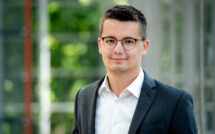
CEMS Alumni Profiles:
Daniel Ortiz
Few graduate programs give master’s candidates the chance to expand their academic training alongside an opportunity to develop and hone their professional workplace skills, but NYU’s Center for European and Mediterranean Studies (CEMS) offers the rare opportunity to do both in one of the world’s greatest cities.
It is my firm belief that the best scholars, researchers, and academics possess skills that go beyond disciplinary training. Extensive knowledge in methodology or field research doesn’t necessarily impart expertise in managing institutional budgets, serving on administrative committees, running a team, or even simpler skills like presenting research or writing funding proposals. Scholars and administrators alike need to have an appreciation for both kinds of work and the master’s program with CEMS affords its students a remarkable introduction to both sets of skills before sending them on to the next steps in their career, be it academic, professional, or a combination of both. Thanks to the program’s exceptional design – which is in no small part thanks to the considerable efforts of its faculty and staff – the opportunities for growth and learning, both professional and academic, are abundant.
I joined CEMS in the fall semester of 2020 just several months after completing a bachelor’s degree in history. The first courses I took at the department introduced me to fields of research in the social sciences that I never fully understood. As a student of history, I asked how there could possibly be more to research than narrative appraisal and interpretation? Methods, research design, theory – perplexing as it may seem to the reader, these were all foreign concepts to me at the time. With introductions to international relations, political science, law, anthropology, and sociology, I quickly realized that there was much more to studying the problems of the world beyond a basic appreciation for recognizing change over time. Thanks to this, and the patience of my professors, my academic horizon’s narrow field of view expanded and, importantly, did so in a way that encouraged my peers and me to understand and appreciate the unique approaches that these different disciplines bring to bear on the same contemporary issues.
With the master’s thesis, I took the chance to further explore a personal interest of mine at the time, contemporary German foreign and security policy. It took several years of working at a bipartisan think tank in Washington, D.C. after graduating from CEMS, however, to finally realize that the questions I am most interested in investigating are better answered by political science.
I am currently writing from a doctoral program in political science at Heidelberg University in Germany, where I am studying the comparative political economy of defense-industrial cooperation. Guided by questions about how and why states cooperate in defense-industrial policy areas, my research focuses on the political and economic logics that underpin (non)cooperative decision-making at the national level. Near the end of my first year, I am presently working on a revision of a subsystem level theory for my dissertation that explains how states pursue cooperation as a result of domestic coalition formation between governmental, industry, and military actors. I would not be here today if it were not thanks to my professional workplace experience, which my training at CEMS made possible.
Daniel Ortiz is a PhD Candidate in Political Science at Universität Heidelberg.
Amós del Castillo Petidier
Stumbling upon NYU’s Center of European and Mediterranean Studies was a stroke of luck. Nearly four years ago, I received a Fulbright scholarship to study in the US knowing little about what master’s program suited me best. I applied to several programs in history, including NYU’s, with my application emphasizing my desire for interdisciplinary courses and a strong research focus to lay the groundwork for a future PhD. I still remember what the admission’s letter stated, “Based on your application, we encourage you to join the Master of Arts in European and Mediterranean Studies.” Today, as I begin the second year of a PhD program in contemporary history at Universidad Complutense de Madrid, where I study contradictions in the Europeanization processes of Spain, Greece, and Portugal through their mega-events (Lisbon’s ‘92 Expo, Seville’s ‘98 Expo, and Athens Olympics in ‘04)’’, I can confidently say that my time at CEMS profoundly influenced the way I approach research.
At CEMS, I was exposed to a range of disciplines with diverse methodologies. Not only did the program offer courses taught by political scientists and historians, but it also allowed students to take classes from other departments, provided they aligned with European studies and individual research interests. As my thesis project addressed the role of mega-events, such as the Olympic Games and World Expos, in the modernization of Southern Europe, this flexibility was invaluable. It meant taking courses on urban planning, history of international relations, and Mediterranean studies, among others, which significantly enriched my understanding and approach to my research.
In addition to a multidimensional approach, CEMS’ distinctly research-oriented program was a boon to my growth. As a small department, the CEMS faculty dedicated significant time to advising us on our master’s thesis topics from the very beginning. The process was gradual and cumulative: we started by identifying a broad area, participated in a Graduate Research Seminar, and eventually refined our projects during a summer course. This structured process, along with the resulting assignments—such as thesis proposals, annotated bibliographies, and outlines—continues to serve as a valuable reference for me when defining the scope and research questions of my PhD thesis. Looking back, it is clear to me that CEMS provided me with the tools, insights, and confidence to pursue my academic ambitions. It was a pivotal step in my journey, and I remain grateful for the opportunity to be part of such a dynamic and enriching program.
Amós del Castillo Petidier is a PhD candidate in Modern History at the Universidad Complutense de Madrid. He is a participant in the Europaeum Scholars Programme, an initiative run by Europaeum—a network of leading European universities—that equips doctoral students with leadership, policy, and interdisciplinary research skills to tackle European and global challenges.
Victoria Anastasia Aranowicz
I am a cultural historian focusing on belief systems and how they affect societal and political ideologies. I argue that religion, faith, and folkloric traditions are crucial to understanding the creation of and response to explicit historical events. Specifically, as a DPhil student at the University of Oxford in the United Kingdom, I am researching the birth of the Neopagan Slavic Native Faith in Poland and Soviet Russia in the twentieth century (1920s-1990s). Amongst a few different aims is to add to historical scholarship on the transnational relationship between the two countries, as well as a fresh perspective on the actions of the Soviet government.
It wasn’t until I was accepted into New York University’s Center for European and Mediterranean Studies’ BA/MA program that this special interest manifested. As a junior History undergraduate at NYU, the Master of Arts program at CEMS attracted my attention with its diverse courses, ranging from environmental history to contemporary far-right politics, and professors that draw on their experiences from various career fields. I was beyond nervous about tackling my MA with no official bachelor’s diploma yet; however, there was no reason for panic. For two years, the faculty and administration at CEMS thoroughly supported my academic journey and unique historical subject.
My chosen MA thesis project was an analysis of appropriating and co-opting old Slavic Pagan traditions during the ideological nationalistic fight between the Polish Catholic Church and PZPR’s communist government, overseen by Dr. Emma Rosenberg, a faculty member at CEMS, and Dr. Stefanos Geroulanos, director of the Remarque Institute at NYU and an affiliated professor of CEMS. Their confidence in me, my research and writing abilities, and my thesis topic fueled my scholarly growth. Without their academic counsel, I would not be so fortunate to be at my current university.
From my time at CEMS, I have learned that exploring beyond the surface level, not just in history but in other subjects, is not only appreciated but required. Attacking historical events from multiple interdisciplinary angles gives us more room to understand and analyze situations and consequences, and therefore pushes us to evolve as a global population. The faculty and administration at CEMS gave me a solid educational foundation for my next career steps, most of which I am now using in my current PhD program. They also gave me the courage to pursue topics that are important to me and that I believe are essential to academia and socio-political advancement, including my current research on the Slavic Native Faith.
Victoria Anastasia Aranowicz is a DPhil candidate in History at the University of Oxford and an Editor at Europinion.




